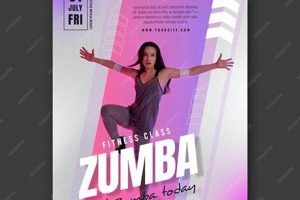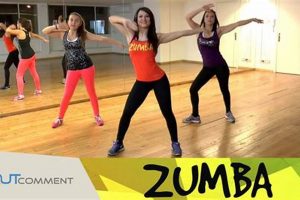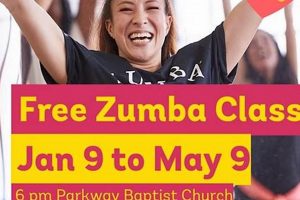Zumba instruction offered without charge within the Houston metropolitan area allows individuals to participate in fitness activities without incurring financial costs. These opportunities are generally structured as group sessions, blending dance and aerobic movements performed to music.
Accessibility to fitness programs promotes community well-being by enabling participation for individuals across diverse socioeconomic backgrounds. These opportunities can contribute to improved cardiovascular health, weight management, and stress reduction, fostering a healthier lifestyle. Historically, subsidized or no-cost fitness initiatives have aimed to address disparities in access to health resources within urban environments.
The following sections will outline resources for locating complimentary Zumba sessions, provide guidance on what to expect during a typical class, and offer supplementary information regarding fitness opportunities within the city.
Tips for Accessing Complimentary Zumba Instruction in Houston
Maximizing benefits from cost-free Zumba opportunities requires strategic planning and proactive engagement.
Tip 1: Utilize Online Search Engines. Employ specific keywords when searching online. Refine searches with terms like “community center,” “park district,” or “nonprofit” in conjunction with “Zumba” and “Houston” to narrow results.
Tip 2: Consult Community Resource Listings. Review local community calendars and resource directories maintained by organizations such as the YMCA, community centers, and public libraries. These often list free or low-cost fitness programs.
Tip 3: Contact Local Parks and Recreation Departments. Many city and county parks and recreation departments offer free fitness classes, including Zumba, as part of their community outreach programs. Contact the department directly or check their website for schedules and locations.
Tip 4: Leverage Social Media Platforms. Follow local fitness studios, community organizations, and health-focused groups on social media platforms like Facebook and Instagram. They frequently announce free classes or promotional events.
Tip 5: Inquire at Local Fitness Centers. Some fitness centers occasionally offer introductory Zumba classes or community outreach events that are free to the public. Contact centers directly to inquire about these opportunities.
Tip 6: Plan Transportation Strategically. For locations not easily accessible by personal vehicle, investigate public transportation options or carpooling possibilities to minimize logistical barriers to attendance.
Tip 7: Confirm Class Details in Advance. Verify the schedule, location, and any specific requirements (e.g., registration, attire) with the organizing entity before attending a session to avoid potential inconveniences.
By implementing these strategies, individuals can effectively locate and access no-cost Zumba instruction, enhancing their opportunities for physical activity and well-being.
The concluding section will consolidate key information and provide final recommendations for engaging with fitness resources in Houston.
1. Availability and Scheduling
The availability and scheduling of complimentary Zumba sessions directly influence accessibility within the Houston metropolitan area. Limited availability, such as infrequent classes or sessions held at inconvenient times, creates a significant barrier to participation, particularly for individuals with inflexible work schedules, family obligations, or transportation limitations. The practical effect is that despite the “free” aspect, the resource remains underutilized by the intended demographic. For instance, a free Zumba class offered only on weekday mornings effectively excludes individuals employed during those hours.
Conversely, a wider range of scheduling options, including evening and weekend classes, coupled with more frequent sessions throughout the week, demonstrably increases participation rates. Collaboration with community centers and recreational facilities to leverage existing infrastructure and diverse scheduling is key. Example initiatives could include partnering with local schools to use their facilities after hours or offering sessions at public parks during weekend afternoons. Careful consideration of peak demand periods and community demographics is crucial for optimizing class times and ensuring broader reach.
In summary, the challenge lies in aligning class times with the diverse needs of the Houston community. Limited availability directly undermines the potential benefits of cost-free Zumba opportunities. Strategic scheduling, informed by community demographics and accessibility considerations, is essential to maximizing participation and promoting healthier lifestyles within the city.
2. Location Accessibility
The practicality of no-cost Zumba offerings in Houston hinges significantly on location accessibility. Physical proximity to class venues, coupled with convenient transportation options, constitutes a critical determinant of program utilization. The absence of readily available transportation or the presence of substantial distances to class locations diminishes the effectiveness of the “free” aspect, effectively excluding individuals from participation. For example, a complimentary Zumba class held in a geographically isolated area, lacking reliable public transport connections, becomes inaccessible to many residents, particularly those with limited financial resources who may not own private vehicles.
Examining successful fitness initiatives reveals a consistent emphasis on strategically locating programs within densely populated areas or near existing community hubs, such as libraries or community centers. This approach leverages pre-existing foot traffic and infrastructure, minimizing logistical barriers to access. Moreover, partnerships with local transportation providers, offering subsidized or free transport passes, can further mitigate accessibility challenges. Successful examples include the integration of free fitness classes within community centers situated along major bus routes, enabling convenient access for a wider range of individuals. Another illustrative case involves the collaboration of a Houston-based non-profit organization with a local rideshare company to provide discounted transportation to fitness classes for low-income residents.
In conclusion, location accessibility stands as an indispensable element of effective cost-free Zumba programs. Simply eliminating monetary cost is insufficient; programs must actively address geographic and transportation-related barriers to ensure equitable access. Proactive engagement with transportation providers, strategic program placement within existing community infrastructure, and ongoing assessment of accessibility challenges are essential components of a successful implementation strategy, maximizing the potential of no-cost Zumba to promote community health and well-being.
3. Instructor Qualifications
The quality and safety of complimentary Zumba sessions in Houston are inextricably linked to the qualifications of the instructors leading the classes. While the absence of a fee may make these sessions attractive, inadequate instructor training or certification can compromise the participants’ experience and potentially lead to physical injury. Certified Zumba instructors undergo specific training programs that equip them with the knowledge and skills to design safe and effective routines, modify exercises for various fitness levels, and recognize signs of distress or injury. Without such qualifications, instructors may lack the expertise to provide appropriate guidance, leading to improper form, overexertion, or increased risk of musculoskeletal issues. For example, an instructor without proper certification may push participants beyond their physical limits, increasing the risk of sprains, strains, or even more serious injuries. The provision of cost-free services should not equate to a compromise on safety and quality.
Several organizations and community centers in Houston prioritize certified instructors for their free Zumba programs, recognizing the importance of qualified leadership. These organizations often partner with Zumba Education Specialists (ZES) who provide ongoing training and support to local instructors. By ensuring that instructors hold valid Zumba certifications and participate in continuing education, these programs can maintain a higher standard of instruction and minimize the risk of injury. Furthermore, some organizations conduct background checks on instructors to ensure the safety and well-being of participants, particularly in classes involving children or vulnerable adults. This proactive approach helps to create a safe and welcoming environment for individuals of all fitness levels to engage in physical activity. One practical application is to include instructor credentials as a prominent feature in program advertising, allowing prospective participants to make informed decisions about their fitness choices.
In summary, while complimentary Zumba sessions offer a valuable opportunity for physical activity, the qualifications of the instructors are paramount to ensuring a safe and effective experience. Organizations providing cost-free Zumba programs have a responsibility to prioritize certified instructors and implement safety protocols to protect participants. Individuals seeking free Zumba classes should inquire about instructor credentials and choose programs that prioritize qualified leadership. This attention to instructor qualifications will ultimately enhance the effectiveness and sustainability of these programs, promoting health and wellness within the Houston community.
4. Equipment Requirements
The allure of no-cost Zumba instruction within Houston can be tempered by subtle, yet significant, equipment requirements. While the sessions themselves are offered without charge, participants might encounter implicit or explicit expectations concerning attire and accessories. The absence of explicitly stated equipment needs can lead to unforeseen expenses or feelings of exclusion for individuals with limited financial resources. For instance, some classes recommend or even necessitate specialized athletic shoes to mitigate injury risk, an expense that may render the seemingly “free” class unaffordable for certain segments of the population. Failure to address equipment requirements upfront can inadvertently undermine the intended accessibility of these initiatives.
Furthermore, the ambiance of the Zumba environment and the implied social norms can introduce pressure to conform to certain aesthetic standards. Participants might perceive a need to acquire specific workout attire or accessories to feel comfortable and accepted within the class setting. This implicit pressure can create a barrier to participation, particularly for individuals who lack the financial means to meet these unspoken expectations. Successful programs actively address this issue by explicitly stating minimal equipment requirements and promoting an inclusive environment that values participation over adherence to specific fashion trends. For example, some community centers provide loaner shoes or accept donations of gently used athletic wear to ensure that all participants have access to the necessary equipment. Others emphasize the importance of comfortable clothing that allows for freedom of movement, rather than focusing on brand names or specific styles.
In conclusion, a comprehensive understanding of the interplay between equipment requirements and the promise of no-cost Zumba sessions is essential for promoting equitable access to fitness opportunities. Transparency regarding equipment needs, coupled with proactive efforts to minimize financial barriers, can enhance the inclusivity and effectiveness of these programs. Failing to address this often-overlooked aspect can inadvertently perpetuate disparities and limit the reach of otherwise valuable community resources. Promoting a welcoming and non-judgmental environment that prioritizes participation over appearance is crucial to ensuring that complimentary Zumba sessions genuinely serve the diverse needs of the Houston community.
5. Class Suitability
The alignment of individual fitness levels and prior experience with the demands of Zumba sessions is paramount to maximizing benefits and minimizing potential risks associated with physical activity. Assessing class suitability becomes especially relevant in the context of publicly accessible, no-cost Zumba offerings, where diverse participant backgrounds and varying levels of physical preparedness are often encountered.
- Physical Fitness Level
Zumba incorporates aerobic exercise with dance movements, potentially posing challenges for individuals with limited cardiovascular endurance or musculoskeletal limitations. Novices should seek introductory classes or those specifically designed for beginners, minimizing the risk of overexertion or injury. Participation in advanced classes without adequate preparation can lead to strain or other adverse outcomes.
- Prior Dance Experience
Zumba’s choreography, while adaptable, draws from various dance styles. Individuals lacking prior dance experience might initially struggle with coordination and rhythm, potentially leading to frustration or improper form. Identifying classes that emphasize foundational steps and offer clear, step-by-step instruction can enhance the learning process and foster a more positive experience.
- Health Conditions and Limitations
Individuals with pre-existing health conditions, such as joint problems, heart conditions, or respiratory issues, require careful consideration of class suitability. Consulting with a healthcare professional before engaging in Zumba is advisable to determine appropriate modifications or alternative exercises. Classes designed for specific populations, such as seniors or individuals with disabilities, might offer a more tailored and safer environment.
- Class Intensity and Modifications
Zumba classes vary in intensity and complexity. Understanding the expected level of exertion and the availability of modifications is crucial for ensuring a safe and enjoyable experience. Instructors should be able to provide alternative movements for individuals with limitations or injuries. Programs that explicitly promote inclusivity and offer readily accessible modifications are more likely to accommodate diverse participant needs.
The consideration of class suitability is not merely a matter of individual comfort; it directly influences the effectiveness and safety of Zumba participation. For complimentary sessions, which often attract a wide range of individuals with varying fitness backgrounds, providing clear guidance on class selection and emphasizing the importance of self-assessment becomes particularly critical for ensuring a positive and sustainable engagement with physical activity within the Houston community.
Frequently Asked Questions
The following section addresses common inquiries regarding free Zumba classes within the Houston metropolitan area, providing clarity on practical considerations and program expectations.
Question 1: How is it possible for Zumba classes to be offered without cost?
Funding models for complimentary Zumba sessions vary. Support may stem from municipal park and recreation departments, community centers with allocated budgets for fitness programs, or philanthropic organizations dedicated to promoting community health initiatives. Grants and sponsorships may also contribute to covering instructor fees and facility costs.
Question 2: Are there limitations on participation in these complimentary classes?
Certain classes may impose restrictions based on age, residency within a specific district, or pre-registration requirements. It is advisable to confirm eligibility criteria with the program provider prior to attending a session to avoid potential disappointment.
Question 3: What level of physical fitness is required to participate?
While Zumba can be modified to suit various fitness levels, individuals with pre-existing health conditions or significant physical limitations should consult with a healthcare professional before commencing participation. Beginning classes or those specifically designed for seniors may offer a more suitable entry point.
Question 4: Is specialized attire or equipment required?
While specific attire is generally not mandated, comfortable clothing that allows for freedom of movement is recommended. Supportive athletic shoes are advisable to minimize the risk of injury. Specific programs may recommend bringing a water bottle and towel.
Question 5: How are the instructors for free Zumba classes qualified?
Organizations committed to providing quality instruction typically prioritize hiring certified Zumba instructors who have completed recognized training programs. However, it is prudent to inquire about instructor credentials to ensure a safe and effective class experience.
Question 6: What recourse is available if an injury occurs during a complimentary class?
Liability coverage for participants in free Zumba classes may vary depending on the program provider and the specific circumstances of the incident. It is advisable to inquire about insurance coverage and liability waivers before participating in any fitness program.
These FAQs provide essential information for individuals considering participation in cost-free Zumba sessions in Houston. Understanding these factors can contribute to a more informed and rewarding fitness experience.
The concluding section will synthesize key points and provide actionable recommendations for engaging with fitness resources throughout the Houston area.
Concluding Observations on Free Zumba Classes Houston
This analysis of free Zumba classes Houston has illuminated critical factors influencing program accessibility and effectiveness. The availability of no-cost instruction represents a valuable community resource. However, realizing the full potential requires addressing limitations related to scheduling, location accessibility, instructor qualifications, equipment needs, and class suitability. Neglecting these considerations diminishes the impact of even the most well-intentioned initiatives.
Sustained investment in community health mandates a holistic approach that prioritizes equitable access. The pursuit of wellness should not be constrained by financial barriers or logistical impediments. Therefore, continued evaluation and refinement of free Zumba programs are essential to ensure they effectively serve the diverse needs of the Houston population, fostering a healthier and more vibrant community for all. Organizations offering these services should actively seek feedback and adapt to the evolving needs of Houston residents to maximize the positive impact of these crucial resources.




![Find FREE Zumba Classes Near Me for Ladies - [Location]! The Ultimate Zumba Guide: Dance Your Way to a Healthier You Find FREE Zumba Classes Near Me for Ladies - [Location]! | The Ultimate Zumba Guide: Dance Your Way to a Healthier You](https://mamazumba.com/wp-content/uploads/2025/10/th-896-300x200.jpg)


